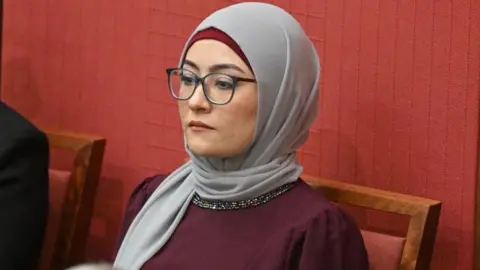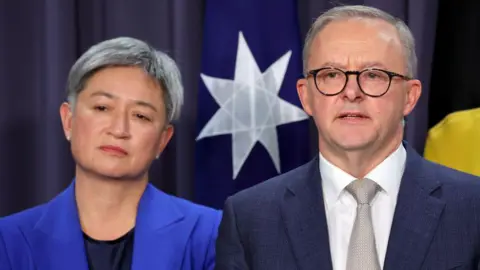6 minutes ago
By Hannah Ritchie, BBC News, Sydney

 Getty Images
Getty Images
Ms Payman is Australia's first and only hijab-wearing federal politician
When Fatima Payman crossed the Senate floor to vote against her government she knew it would come with consequences.
The Australian Labor party has strict penalties for those who undermine its collective positions, and acts of defiance can lead to expulsion - a precedent with a 130-year history.
The last time one of its politicians tested the waters while in power was before Ms Payman was born.
But last Tuesday, the 29-year-old did just that - joining the Green party and independent senators to support a motion on Palestinian statehood.
Officially the Australian government supports a two-state solution, but did not back the motion after trying - and failing - to insert a condition that any recognition should be “as part of a peace process”.
Within hours, Ms Payman had been temporarily suspended from her party room, by the end of the week it would become indefinite - after she publicly vowed to cross the floor again if given the opportunity.
"By her own actions and statements, Senator Payman has placed herself outside the privilege that comes with participating in the federal parliamentary Labor Party caucus," a government spokesperson said.
Prime Minister and Labor leader Anthony Albanese was more concise: “No individual is bigger than the team.”
On Monday, Ms Payman responded by saying she had been "exiled" – explaining that she had been removed from caucus meetings, group chats and all committees.
The dismissal of the senator, elected in what was billed as Australia’s most diverse parliament to date, has drawn a mixed response and raised questions - mainly, whether it’s practical or fair for politicians to toe the line on issues affecting their communities.

 Getty Images
Getty Images
Protesters have taken to cities across Australia
Each step 'felt like a mile'
Ms Payman stands out in Australia’s parliament.
The first and only hijab-wearing federal politician has been described as the embodiment of some of the nation’s most marginalised: a young woman, a migrant, a Muslim.
She described crossing the floor as "the most difficult decision" of her political career, adding that each step in her short walk across the Senate had “felt like a mile”.
However, the 29-year-old said she was “proud” of what she had done, and “bitterly disappointed” others hadn't followed.
"I walked with my Muslim brothers and sisters who told me they have felt unheard for far too long," she said.
The Israeli military launched a campaign to destroy the Hamas group which runs Gaza in response to an unprecedented Hamas-led attack on southern Israel on 7 October, during which about 1,200 people were killed and 251 others were taken hostage.
More than 37,900 people have been killed in Gaza since then, including 23 over the past 24 hours, according to the territory's Hamas-run health ministry.
This has become a volatile political issue in Australia that all sides have sought to carefully manage.
As has been the case in countless other countries, there have been protests from both Jewish and Muslim communities, as well as a sharp uptick in Islamophobia and antisemitism.

 Getty Images
Getty Images
Environment Minister Tanya Plibersek gave Ms Payman a hug on Monday
The senator's move has drawn both praise and criticism.
Anne Aly - who became the first Muslim woman to be elected in Australia’s parliament in 2016 - and has been a fierce advocate for an end to the conflict in Gaza, said she disagreed with Ms Payman’s approach.
“I choose to do things in a way I think will make a material difference on the ground. Fatima chooses to do it her way," she told news outlet the ABC.
But Josh Burns - a Jewish Labor MP from Melbourne - who has a different world view from Ms Payman when it comes to issues such as Palestinian statehood, has been one of her biggest supporters.
“Parliamentarians come from different communities and backgrounds, and trying to balance all those perspectives isn't easy, but we must be an example to the Australian community about how to debate difficult issues respectfully.”
The nation’s Islamic bodies have also issued a joint statement describing Ms Payman’s actions as “courageous” and calling on the Labor party to “echo the voices of the people it represents”.
"Political calculations and attempts to walk both sides have devastating consequences in Palestine and will ultimately end in failure,” it read.
But Mr Albanese called the resolution a "stunt", adding: "We need actually real solutions... this stunt from the Greens was designed to put Fatima Payman in a difficult position. It was designed to do that."
Mr Albanese’s penalty against Ms Payman has been more lenient than the complete expulsion that party rules require.
And he’s left the door open for her to re-enter the fold if she’s willing to change course: “Fatima Payman is welcome to return to participating in the team if she accepts she's a member of it,” he said in an interview on Monday.
‘Not a token representative’
Australian politicians have voted against their own beliefs to fall in line with party politics before.
Queer MPs - including current Foreign Minister Penny Wong - felt a similar conflict in the Labor caucus back in the days when it officially opposed gay marriage.
It’s an issue that has opened Ms Wong up to personal attacks, but she’s remained adamant that quiet advocacy from within the party - rather than public criticism - is the preferred route.
And she says it was a decade of doing just that which saw same-sex marriage legalised.
“Even when we disagree, we have those arguments internally, as you saw over many years in the marriage equality debate. That’s what I did, and I think that’s the right way to go about it,” she told the ABC.
But when asked whether she should have followed precedent, Ms Payman said: “It took 10 years to legislate same-sex marriage... These Palestinians do not have 10 years."

 Getty Images
Getty Images
Penny Wong (L) is adamant that quiet advocacy from within the party is the preferred route
The contrasting approaches represent the changing demands of the Australian public, according to Kos Samaras - one of the nation’s leading pollsters.
He says a growing cohort of young, multicultural voters are increasingly aligning themselves with politicians who aren’t afraid to take a stance on causes their constituents are “passionate about”.
He also argues that migrant communities are no longer willing to accept political messaging that effectively urges them to “keep their head down”.
“Australia has had a terrible history, whether from a societal perspective or political parties - that whenever someone from a diverse background expresses their view, overwhelmingly they’re told to pull their head in.”
“That’s a formula that kind of works when a new group of people migrate to a country and want to keep a low profile as they’re establishing a new life – it’s not going to work with those migrant’s kids. And that’s exactly who we’re talking about.
“These are people who have grown up in a country that has often made them feel like outsiders, and they’re no longer prepared to keep silent,” he adds, noting recent polling from his team which found that many young Australian-Muslim women feel they lack a political voice.
A refugee whose family fled Afghanistan after it fell to the Taliban in 1996, it’s a sentiment that Ms Payman says guides her politics.
“I was not elected as a token representative of diversity,” she said after her temporary suspension last week.
“I was elected to serve the people of Western Australia and uphold the values instilled in me by my late father.”
Ms Payman says that she believes the government is freezing her out to “intimidate” her into resigning.
But Mr Albanese is adamant that his decision is the right one, while emphasising that it is not about Ms Payman’s “policy position” but rather, her decision to “undermine” her party.
For the time being at least, the young lawmaker has vowed to “abstain from voting on Senate matters… unless a matter of conscience arises where I'll uphold the true values and principles of the Labor Party.”

 5 months ago
7
5 months ago
7















 English (US) ·
English (US) ·